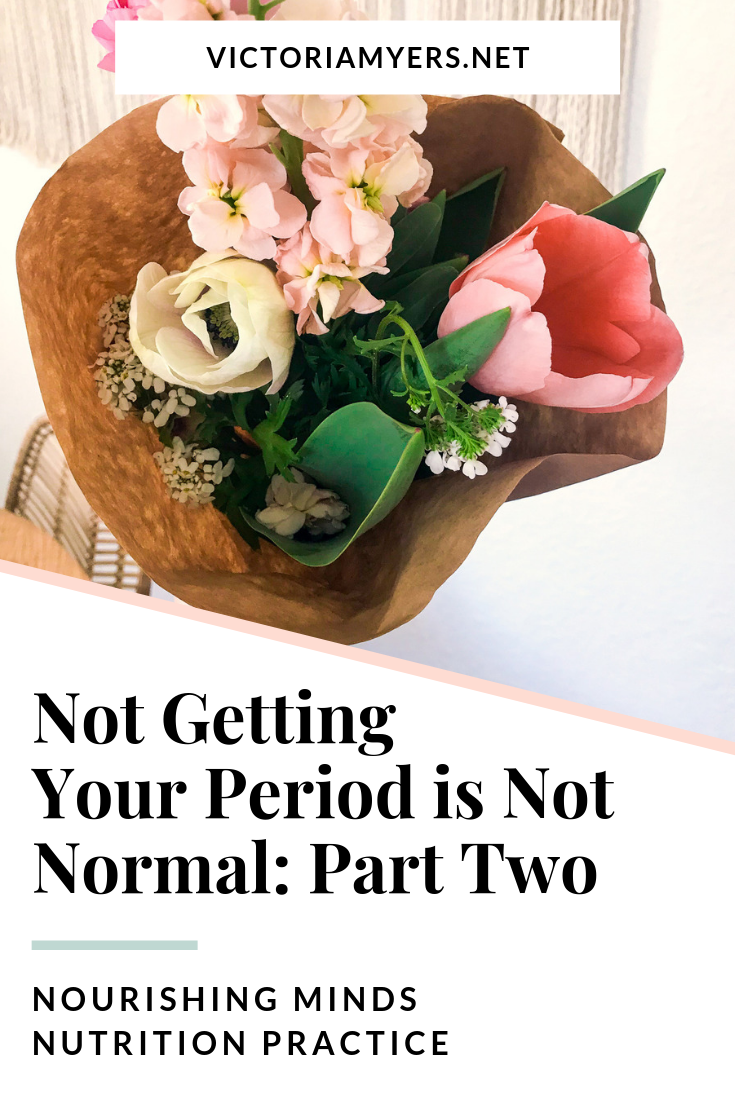Not Getting Your Period is Not Normal: Part Two
By: Kelsey Pukala, dietitian at Nourishing Minds Nutrition
In last month’s blog post, I talked all about the basics of amenorrhea. If you haven’t read that post, I highly recommend reading it before diving into this one. It lays the groundwork for the basics of amenorrhea and some potential reasons why you may be experiencing the absence of a period.
Today, we are going to take a deep dive into hypothalamic amenorrhea (HA): what it is, why it happens and what is happening in the body if you are experiencing HA. I want to preface this post by saying there are SO MANY potential reasons for not having a period. Diagnoses like PCOS, endometriosis, pregnancy (not really a “diagnosis” but a reason to lose your period nonetheless!), thyroid disorders and various other genetic conditions can affect your period and even lead to its absence. It is always important to rule out any and all possible conditions with your doctor that could be affecting your menstrual cycle.
For the purposes of today’s post, we will be talking about HA, as it is one of the most common causes of secondary amenorrhea. The hypothalamic-pituitary-gonadal axis or HPG axis (yep, we’re going there!) refers to the hypothalamus, pituitary gland and gonadal glands almost as if they are a single entity. This axis plays a critical role in the development and regulation of several different body systems like reproduction and immunity. The HPG axis produces hormones that cause women to menstruate. Each gland produces hormones in a precisely timed manner allowing them to work in harmony creating an ideal environment for your body.
The HPG axis is extremely sensitive to the environment. Changes in the environment can then affect the HPG axis and hormone production by disrupting its regularly scheduled programming.
What is considered a change in environment?
Stress (emotional or physical), lack of sleep, under-eating/inappropriate energy intake, over-exercising and other factors can affect this cascade of hormone production.
Normally, a hormone called gonadotropin releasing hormone (GnRh) signals the production of follicle stimulating hormone and luteinizing hormone (FSH and LH), which then help signal ovulation as well as estrogen and progesterone production. Voila! You have a period!
You may be asking… so then why am I NOT getting a period? Great question! Well, when the hormones produced in this axis are disrupted, the entire cascade can go awry. If there is too much stress and not enough rest, production of GnRh is inhibited, which therefore, doesn’t allow for adequate levels of LH, which is needed for ovulation. Without ovulation, we can’t move from our follicular phase to the luteal phase of our cycle. We can then cease menstruation due to inadequate levels of FSH, LH and estrogen. When stress disrupts this system, there is insufficient hormone production and subsequently the lack of a period. This is then known as hypothalamic amenorrhea.
In a nutshell, stress, under-eating and over-exercising are the main causes of HA as they disrupt the hormone cascade in the HPG axis. What can you do if you think you may be experiencing HA? Let’s break down each factor:
UNDER-EATING
Not consuming enough energy and calories for YOU is stress and trauma on the body. That may sound harsh, but I totally stand by that because, in my experience, it’s absolutely true. Under-eating, restricting, limiting/eliminating food groups, not consuming enough fat and/or carbs, eating “clean” or following the latest trendy diet are all forcing your body into a stressful state in which it cannot function adequately. Without adequate nutrition, your body senses a famine. Yes, a famine. In a famine, your body will become extremely efficient by shutting down unnecessary body systems (i.e. reproduction) that are not required for survival because the body is just trying to keep you alive. Cue absent period. I cannot stress enough the important of adequate fats. We need fat in the diet to help adequately produce hormones. We also need enough calories and nutrients. Balance of nutrients and calories is so important to keep our bodies from being in a state of nutritional stress. Also, if you’re constantly stressing about what foods you’re eating, that’s also stress on the body. So, no, maybe eating fast food every single meal wouldn’t provide necessary nutrients for you, but if you’re hyper-focused (dare I say obsessive??) about every food you eat, that is stress and not good either!
OVER-EXERCISING
I feel like every few years the “requirement” for exercise grows significantly more intense! By that I mean, women often feel they aren’t doing “enough” unless they are going to boot-camps, running almost daily, doing HIIT workouts or intense cycling. My question is usually, enough for WHAT? None of these things are bad! And yes, exercise definitely can have benefits, but everyone has a different exercise threshold.
If you’re continuing to pursue intense forms of movement while under significant amounts of stress and/or not getting a period, I would argue that form of exercise is no longer healthy for you at this point in time. Sometimes, stepping back and taking a break from intense movement is necessary to regain a menstrual cycle. Even though exercise can have benefits, it is a form of stress. So, if you’re under-fueling, not sleeping well, stressed about work AND THEN waking up at 6 am to fit a workout in… that could be doing more harm than good by adding to your stress. I’m a huge fan of yoga and walking. Hopefully it goes without saying, but these forms of movement are definitely ENOUGH and sometimes, the body kindness choice is to temporarily step back from exercise.
STRESS
Stress is an umbrella term for everything mentioned above about under-eating and over-exercising, but also includes things like sleep deprivation, work stress, life stress (positive or negative) and even financial stress. I’ve mentioned before that it’s impossible to live a stress-free life, but how can you balance the stress with rest?
Some things to ask yourself here:
-Am I sleeping 7-9 hours a night?
-Do I set aside time for self-care?
-Do I have a morning and/or nighttime routine?
-Do I have/make time to pursue my passions and/or hobbies?
-Am I consuming excessive amounts of caffeine?
-Have I considered talking to a therapist about my stress levels?
If you think you may be experiencing HA, it can be extremely helpful to talk with a healthcare provider, OBGYN and Dietitian to walk with you through the process of regaining your menstrual cycle.
Tell us: Have you experienced lack of period before?
Thank you Kelsey for this amazing blog post! You can find here over on Nourishing Minds Nutrition, the NMN Instagram once a week and make sure you are following Kelsey as well! Kelsey is currently giving 10% off any all the packages to work together, reach out today if you are ready for your journey!





